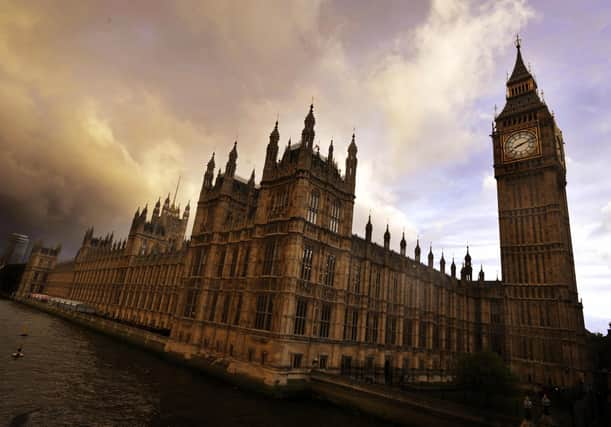Owen Polley: The worst scenario for unionism is that the DUP claims that an ineffective deal is a victory


Sir Jeffrey Donaldson’s team was expected to vote on the government’s offer on the Windsor Framework. That did not happen, but this newspaper reported on Saturday, “The party leader is believed to be confident that he can secure support … (within his party) for a return to power-sharing”.
Although the protocol saga seems to have lasted forever, the timing of the DUP’s meeting was still curious. It coincided with public sector strikes and the secretary of state’s attempts to link pay awards to restoration.
Advertisement
Hide AdAdvertisement
Hide AdSome figures from the Conservative Party even tried to threaten the DUP into compliance by claiming that the Republic would otherwise become involved in Northern Ireland’s internal governance.
If Stormont returns, it will be treated as a great breakthrough, but the most important question remains what it will mean for the Irish Sea border.
The government has not published the details of its offer to the DUP, but they were leaked to the Daily Telegraph last week. According to that report, officials made no attempt to renegotiate the protocol or framework with the EU, but held ‘secret talks’ on the scope for ‘wriggle room’ on its implementation.
The government wanted Brussels to reassure unionists that its interpretation of the framework was accurate. The UK’s ambassador to the EU, Lindsay Croisdale-Appleby, asked the bloc, “for favourable language on the implementation of the green lane”. There was even a laughable plan to rebrand it a ‘UK Internal Market Lane’.
Advertisement
Hide AdAdvertisement
Hide AdIn addition, the paper said that, “Ministers had prepared legislation offering to protect Northern Ireland’s place within the UK, a £3.3 billion financial package and a new East-West council to bolster intra-UK ties.”
If that report is accurate, it confirms the common assumption that, whatever the DUP negotiated with the government, it will not remove the Irish Sea border or repair the Union effectively.
The green lane may become marginally easier to use, but the thrust of its operation will remain the same. Many goods for sale in Northern Ireland will still be required to move through the red lane and some GB companies will regard trading in our market as too risky or complicated.
There’s nothing wrong necessarily with new legislation or committees that aim to strengthen our place in the UK, but it’s difficult to envisage them being significant or powerful. These measures would not be needed, in any case, if we were fully integrated into the rest of the British economy.
However, that is demonstrably no longer the case.
Advertisement
Hide AdAdvertisement
Hide AdLast week in the House of Lords, Nigel Dodds pointed out that Northern Ireland will be excluded from aspects of the latest post-Brexit trade deal, which links Britain to the Trans-Pacific Partnership. In the same chamber, the Windsor Framework sub-committee launched an inquiry into the likely effects of the province being forced into the EU regime for veterinary medicines, at the end of 2025.
The British Dental Association warned that a new European ban on silver fillings, “threatens the future of NHS dentistry in Northern Ireland”. And Jim Allister said that the new regulation showed, “how disastrous it is to be placed under foreign laws we don’t make and can’t change”.
The House of Commons voted for the Rwanda Safety Bill on Wednesday, but the DUP’s deputy-leader, Gavin Robinson, warned that it could create an ‘immigration sea border’ between GB and NI.
That was just a typical week in our province’s political life under the protocol and framework. It underlined that, as yet, we scarcely even understand how profoundly those arrangements will change our relationships with the rest of the UK.
Advertisement
Hide AdAdvertisement
Hide AdThe idea that these are marginal issues is risible. Our place in the UK was previously protected by the Acts of Union, the principle of consent and our integration into countless national arrangements and institutions. It’s difficult to see how comforting words in a bill could make up for the way that these things have been systematically undermined.
The DUP has, to give it its due, pointed out repeatedly problems with the protocol and framework. Lord Dodds is part of the House of Lords’ committee that highlighted countless issues with the Irish Sea border that the government barely acknowledges; with veterinary medicines merely the latest theme.
The party’s interventions on the Rwanda Bill were useful too, pointing out difficulties that would not otherwise have gained publicity. At the same time, unless there are major developments to which we are not yet privy, it’s difficult to take seriously Sir Jeffrey Donaldson’s contention that the negotiations with the government made ‘significant progress’.
The argument for going back to Stormont can, in theory, be separated from the Irish Sea border problems. The government consistently refused to fulfil its responsibility to reassume powers devolved from Westminster, in the absence of a power-sharing executive. And the DUP’s boycott was bound to start looking like failure, if it didn’t achieve results.
Advertisement
Hide AdAdvertisement
Hide AdThe worst scenario for unionism, though, is that the party claims that an ineffective deal is a victory.
In those circumstances, the Irish Sea border will simply be accepted as a permanent fact of life and our hybrid status in the UK will be confirmed. Perhaps even more importantly, it will show that Northern Ireland’s Union with Great Britain can be changed or diluted in the future without unionists’ consent, or even their input, with barely a whimper.
We cannot yet say fairly that that is the case. But it’s clear, at least, that the sea border has not been removed, the DUP’s seven tests have not been met and that its strategy has not worked.